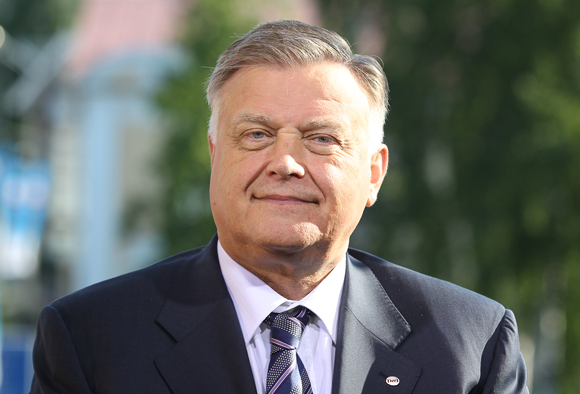Service functions
-
Download center
-
Add to My Report
-
My Report (0)
-
Print this Page
-
Download in PDF
-
Share
-
Feedback
-
Interactive analysis
-
Browsing history
-
Offline version
-
Company in soc.networks
-
Compared to 2011
-
Popular pages
-
Company on the map
-
Compact view
| Enter e-mail recipient * | Your e-mail * | Comment : | |
| * required fields | |||
Opening address of the President of JSC “RZD” V. I. Yakunin

Dear colleagues and partners,
2012 was special for us, as it was an anniversary year. 175 years ago, Russia embarked upon the mass construction of railways, thereby laying the foundation for strong industrial growth, creation of the common economic space, and the development of domestic and foreign trade.
Today, just as many years ago, railways remain at the heart of Russia’s transport complex and continue to meet the increasing needs of its economy and residents.
Last year, freight turnover using the JSC “RZD” infrastructure was 2.783 trn ton-kilometers and the loading volume increased to 1.272 bln tons. Both indicators demonstrated growth compared to 2011 of 2.7 times and JSC “RZD” held its strong lead in both indicators globally.
Growth in passenger transportation was 6 percent with 1.059 bln passengers choosing to travel by railway. High-speed passenger transportation is growing at an even higher pace; last year, more than 3 mln people traveled on Sapsan trains. Railways remain one of the most affordable means of transport for Russian residents. The ticket purchase microcredit and loyalty programs launched by us are expected to increase further the appeal of railway services to individuals. In less than half a year, some 100 th. people joined our loyalty program "RZD-Bonus“.
JSC “RZD” restructuring
In 2012, we completed most of the structural transformation related to our transition fr om a conventional and mainly territory-based system of Company management to an advanced matrix structure of the Holding Company. A key role in operations management is now carried out by network-wide specialized directorates; their activities are coordinated at both a regional and federal level; chains of command have been created for all major lines of the Holding Company’s activities. The JSC “RZD” administration has been converted into a strategic management body called Corporate Center and railways are being transformed into regional centers of corporate management.
In the course of it history, Russian railways have seen more dramatic reforms than this: privatization in the 1860s, the nationalization of roads in 1880s, the Soviet nationalization of 1917, and the war years.
During our recent reform, 85 subsidiaries and affiliates were removed from the Holding Company’s structure; the aggregate net assets of the companies whose shares and stakes are owned by JSC “RZD” are now valued at around RUR 500 bln. JSC “RZD” has fully attained its targets regarding the increase in income from the sale and lease of marginal and unused property, which amounts to some RUR 7.3 bln.
Largest projects
In Vladivostok, the launch of an intermodal passenger service along the Vladivostok — Knevichi airport route was completed as a part of the preparation for the APEC summit. Brand new hubs were set up in Kazan for the start of the 27th World Summer Student Games in Adler during the preparation for the winter Olympics in Sochi. Intermodal systems ensure complementary services of various other forms of transport. This approach is characteristic of the next generation of transport systems and it significantly enhances the appeal of railways, which is particularly important in the context of growing interspecific competition for transport.
A significant part of the investment projects implemented by the Company is aimed to eliminate “bottlenecks” on the sections wh ere infrastructure restrictions prevent an increase in railway capacity. Specifically, we have intensified efforts at the Moscow rail junction and, with financial support from the Investment Fund of the Russian Federation, we have completed the largest construction of the new Kuznetsovsky tunnel at the Far Eastern Railway. Its capacity on this section will nearly triple in the long term.
I would like to stress that during large-scale construction, for example, the Olympic railway facilities in Sochi, we seek to minimize environmental impact.
A regulatory “network contract” will help accelerate railroad construction and reconstruction and optimize the Holding Company’s investment costs. It is being prepared by JSC “RZD” in co-operation with the Russian Government and we hope that it will set a state standard with regard to the level of railway capacity, which is currently absent today and which will determine a required volume of budgetary investments in infrastructure development.
A more effective industry
In late December 2012 the Common Network Process of Railway Freight Transportation developed by JSC “RZD” was adopted. The document regulates interaction between all transportation participants, ensures the stability of transportation and their more efficient use of the rail transport infrastructure and, eventually, will lead to a reduction in transport costs for the economy.
Taking into account the transportation tariff regulation and the significant increase in prices of resources consumed by JSC “RZD”, the financial stability of the Company remains at the same level as in recent years. Nevertheless, we continue to take efforts to make cost-savings in resources and to increase labor productivity in order to keep transportation costs down: today, their growth rate is below the inflation level.
JSC “RZD” remains one of the largest taxpayers in Russia. In 2012, payments to budgets of all levels exceeded RUR 256 bln.
Brand new level of customer service
A major event of last year was the completion of the acquisition by JSC “RZD” of a 75% share of Gefco, an international logistics operator. Once this company is fully integrated into the Holding Company’s structure we expect this acquisition to help us significantly accelerate the development of comprehensive transport and logistics services and, in the longer run, move Russian railways to a new global level.

 Address of the President
Address of the President
 175th Anniversary of Russian Railways
175th Anniversary of Russian Railways
 Analysis
Analysis
 Save Key Indicators to XLS
Save Key Indicators to XLS
 Transport Development Strategy
Transport Development Strategy
 Investment Activity
Investment Activity
 Download Chapter Financial and Economic Performance
Download Chapter Financial and Economic Performance
 Rating
Rating
 Loan Portfolio
Loan Portfolio
 Management System
Management System
 Governing Structure Of JSC Russian Railways
Governing Structure Of JSC Russian Railways
 Personnel management
Personnel management
 Housing policy
Housing policy